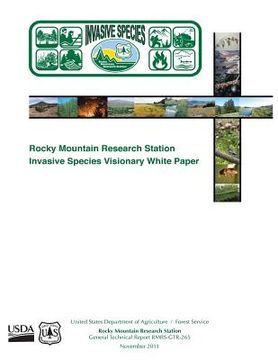Rocky Mountain Research Station Invasive Species Visionary White Paper (en Inglés)
Reseña del libro "Rocky Mountain Research Station Invasive Species Visionary White Paper (en Inglés)"
Invasive species represent one of the single greatest threats to natural ecosystems and the services they provide. Effectively addressing the invasive species problem requires management that is based on sound research. We provide an overview of recent and ongoing invasive species research conducted by Rocky Mountain Research Station scientists in the Intermountain West in order to familiarize managers with the Station and its products. We also provide several links to continuously updated web sites and a periodic newsletter that covers Rocky Mountain Research Station's invasives species research. This document contains an overview of invasive species research efforts by the Rocky Mountain Research Station (RMRS) to familiarize managers with the Station and its products. Invasive plant, pathogen, invertebrate, and vertebrate species are among the greatest threats to forest, range, aquatic, and urban forest ecosystem health. Exotic species invasions in the United States cost an estimated $120 billion annually in lost revenues and mitigation. Expanding global trade increases both the introductions of invasive species and the costs associated with preventing introductions and managing new infestations. To address these threats, a comprehensive strategy is needed with a strong research component at its core. Damaging impacts of exotic infestations include diminished productivity, decreased carrying capacity for livestock and wildlife, lowered recreational value, increased soil erosion, decreased water quality, and loss of native species. As native vegetation becomes displaced, further alterations in natural ecosystem processes occur, including changes in fire frequency and nutrient cycling. The impacts of invasive species can be exacerbated by human activities such as disturbance, fertilization, increasing CO2, and climate change. Exotic weeds are greatly reducing diversity and productivity of forests and rangelands; insects and pathogens are killing trees that are essential for ecosystem functions; and aquatic algae, invertebrates, and fish invaders are disrupting native fisheries and aquatic ecosystems. Addressing the invasive species threat requires robust scientific understandings that can be used to fuel progressive management in the four action areas of: (1) prediction and prevention; (2) early detection and rapid response; (3) control and management; and (4) restoration and rehabilitation. This document describes RMRS's invasive species research and its published works. RMRS has the broad scientific expertise to conduct multidisciplinary research on invasive species issues with special emphasis on terrestrial and aquatic habitats throughout the Intermountain West. RMRS scientists provide ecological and biological information to help managers detect and eradicate new invaders that are still confined to limited areas. For well-established, widespread invasive species, RMRS contributes to the development and testing of landscape-scale mitigation strategies to prevent further spread into new areas and to manage invasive species to ecologically and socially acceptable levels using environmentally compatible tools and integrated control programs. RMRS scientists are working with university collaborators to develop seed mixes of native species that are competitive with exotic weeds to improve restoration and reduce weed invasion following management activities and wildfire. RMRS scientists are extremely active in addressing all aspects of invasive species management. However, RMRS does not have a program area assigned to invasives research, so research in this area has been an ad-hoc effort by independent scientists. This document represents the physical manifestation of RMRS scientists gathering to evaluate invasive species research needs, collate current research efforts, and develop a common vehicle for disseminating research products.

